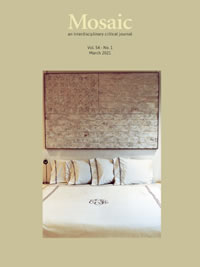Issue 54.1
Overview

General Issue
Published: March 2021
View the issue introduction or see the issue summary and contents below.
8 essays, totalling 168 pages
$24.95 CAD
Featuring the work of Louise Lawler on its cover, Mosaic 54.1 includes essays on Dylan Thomas; Man Ray and Robert Desnos’s L’Étoile de mer; the figure of the mother as social activist in Muriel Rukeyser and Maxo Vanka; Wallace Stevens’s Harmonium; famine in Ulysses and the work of Mo Yan; Catherine Malabou’s notion of plasticity; Derirda and Kant; and Octavia Butler’s Kindred.
‘The Flesh’s Vision: Dylan Thomas’s Poetics of SensationSophie Laniel-Musitelli Dylan Thomas’s early poems shift the landmarks of sensory experience from the primacy of sight to a distribution of sensation throughout the body. They draw on Romantic poetics to recover the original impact of sensation, before the division of the senses, before the dissolution of sense data into mental images. | |
Reimagining Vision in the Surrealist Cinepoem L’Étoile de merLindsey Richter In 1928, artist Man Ray and poet Robert Desnos created the sixteen-minute L’Étoile de mer, an automatic-poem-turned-film noted for its visual experimentation. The cinepoem merges verbal and pictorial ways of seeing to instill in its audience an experience of the haptic, unveiling a new sensory epistemology. | |
The Mother as Social Activist in Muriel Rukeyser’s ‘The Book of the Dead’ and Maxo Vanka’s MuralsAaron Rovan This essay examines the connections between Rukeyser’s poem sequence and Vanka’s murals, arguing that these works from the 1930s subvert the New Deal call for women to espouse traditional domestic duties. Rather, they envision a public space where women, particularly mothers, take an active role in advocating for social justice. | |
The Sense of the Visible: Relational Poetics in HarmoniumIan Tan This essay will read the poems in Wallace Stevens’s Harmonium together with the philosophy of Martin Heidegger in order to examine how Stevens imparts philosophical gravity to his use of language in the early poetry in a Heideggerian way, through grounding the self in a fundamental attitude of worldly openness. | |
Cannibalism in Joyce and Mo Yan: Famine Memory in Ulysses, The Republic of Wine, and FrogHye Ryoung Kil This essay examines cannibalism as used by Joyce and Mo Yan to allude to the Great Famines which the Irish and the Chinese suffered in common. The two authors suggest that not only structures of power but also individuals were responsible for the famines that caused a great number of deaths. | |
Malabouian Plasticity Beyond SurfacesJames Martell This essay investigates Malabou’s notion of plasticity, confronting it with the visual or plastic arts. It shows how overlooking all surfaces of inscription allows Malabou to promote a purely dynamic notion of plasticity that she sees in both neurological and philosophical processes, purportedly going beyond aesthetics and philosophies of the trace. | |
Animal, Subject, ConstitutionJacques de Ville Subjectivity and a civil constitution, according to Kant, are both made possible by a certain power or ability, which the human being has in comparison with animals. This essay examines Derrida’s reading of Kant’s Anthropology from a Pragmatic Point of View, and explores its implications for constitutional democracy. | |
The Trouble: Family, Genre, and Hybridity in Octavia Butler’s KindredKimber L. Wiggs This essay analyzes the protagonist of Octavia Butler’s Kindred as a multiracial character whose familial relationships define her identity. Examining conventions of genre and theories of race construction, I show that Butler uses Dana’s hybridity to comment on contemporary constructions of identity in the United States. |